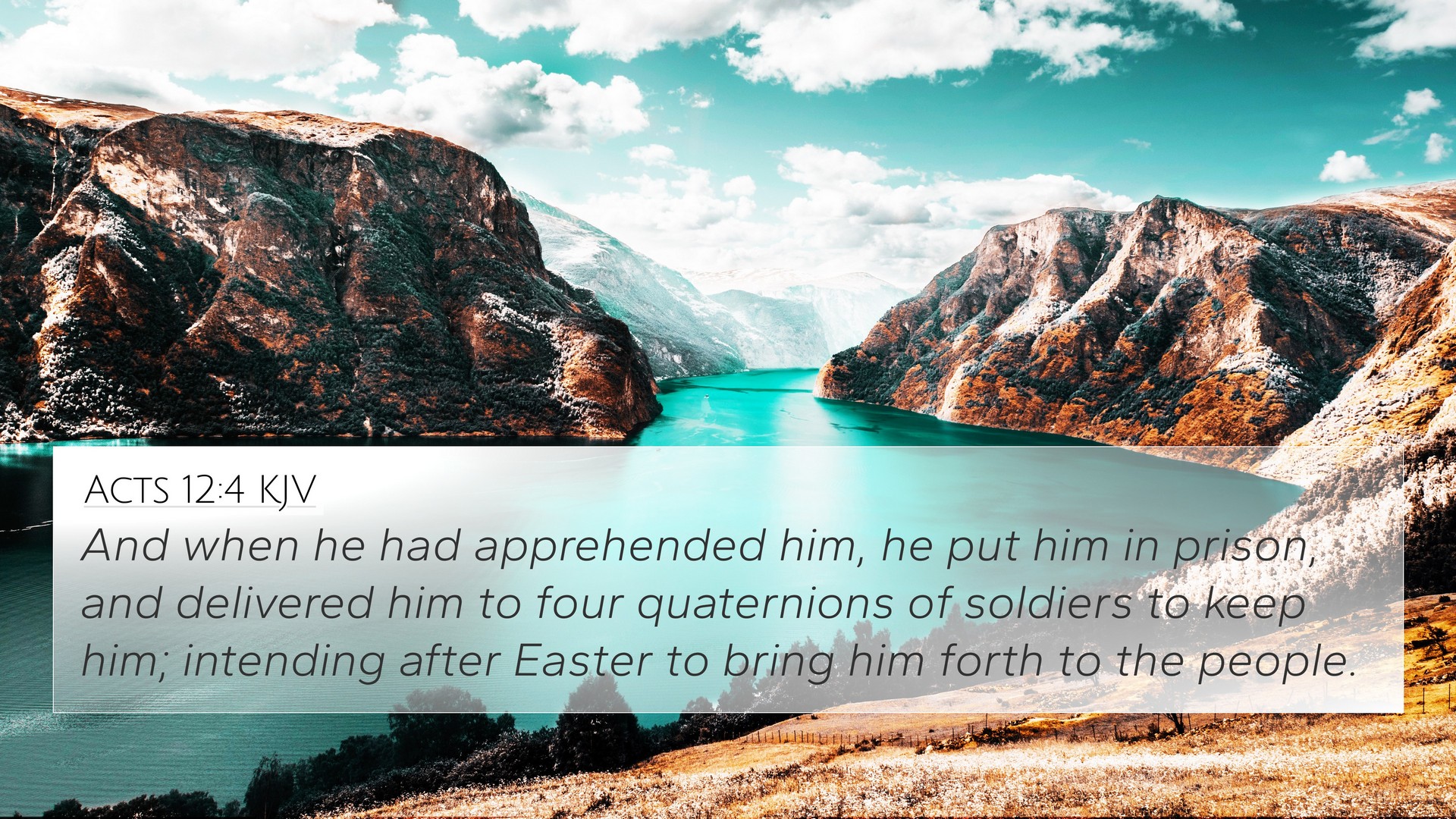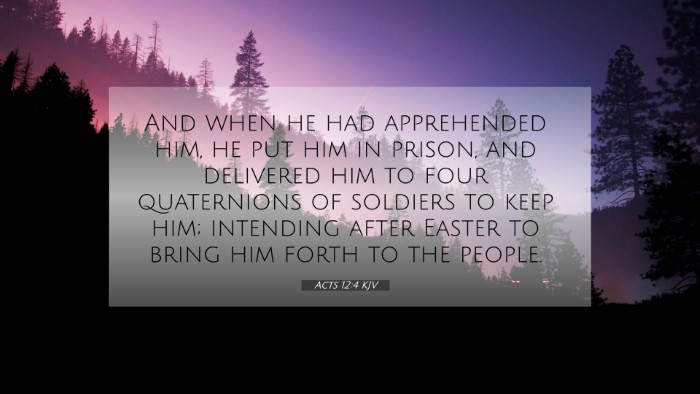Old Testament
Genesis Exodus Leviticus Numbers Deuteronomy Joshua Judges Ruth 1 Samuel 2 Samuel 1 Kings 2 Kings 1 Chronicles 2 Chronicles Ezra Nehemiah Esther Job Psalms Proverbs Ecclesiastes Song of Solomon Isaiah Jeremiah Lamentations Ezekiel Daniel Hosea Joel Amos Obadiah Jonah Micah Nahum Habakkuk Zephaniah Haggai Zechariah MalachiActs 12:4 Similar Verses
Acts 12:4 Cross References
And when he had apprehended him, he put him in prison, and delivered him to four quaternions of soldiers to keep him; intending after Easter to bring him forth to the people.
Uncover the Rich Themes and Topics of This Bible Verse
Listed below are the Bible themes associated with Acts 12:4. We invite you to explore each theme to gain deeper insights into the Scriptures.
Acts 12:4 Cross Reference Verses
This section features a detailed cross-reference designed to enrich your understanding of the Scriptures. Below, you will find carefully selected verses that echo the themes and teachings related to Acts 12:4 KJV. Click on any image to explore detailed analyses of related Bible verses and uncover deeper theological insights.
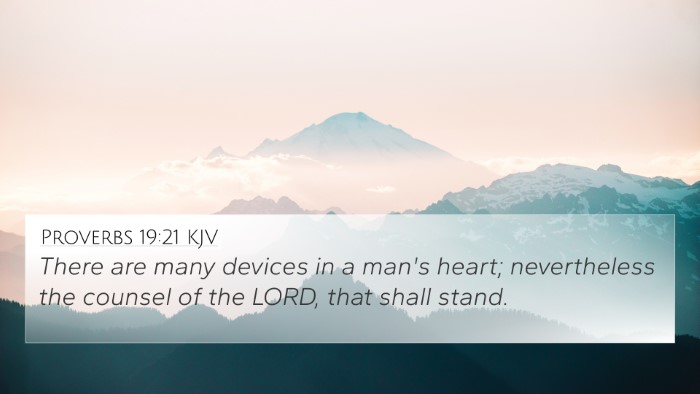
Proverbs 19:21 (KJV) »
There are many devices in a man's heart; nevertheless the counsel of the LORD, that shall stand.
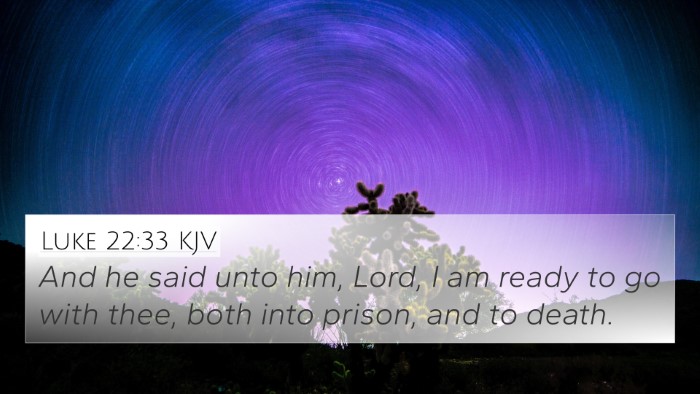
Luke 22:33 (KJV) »
And he said unto him, Lord, I am ready to go with thee, both into prison, and to death.
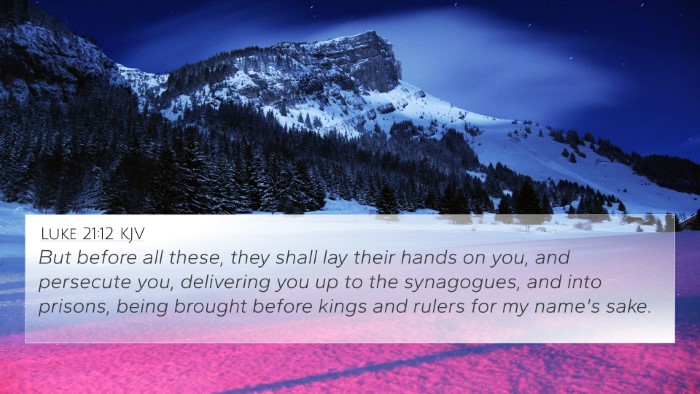
Luke 21:12 (KJV) »
But before all these, they shall lay their hands on you, and persecute you, delivering you up to the synagogues, and into prisons, being brought before kings and rulers for my name's sake.

John 21:18 (KJV) »
Verily, verily, I say unto thee, When thou wast young, thou girdest thyself, and walkedst whither thou wouldest: but when thou shalt be old, thou shalt stretch forth thy hands, and another shall gird thee, and carry thee whither thou wouldest not.

John 13:36 (KJV) »
Simon Peter said unto him, Lord, whither goest thou? Jesus answered him, Whither I go, thou canst not follow me now; but thou shalt follow me afterwards.

Esther 3:6 (KJV) »
And he thought scorn to lay hands on Mordecai alone; for they had shewed him the people of Mordecai: wherefore Haman sought to destroy all the Jews that were throughout the whole kingdom of Ahasuerus, even the people of Mordecai.
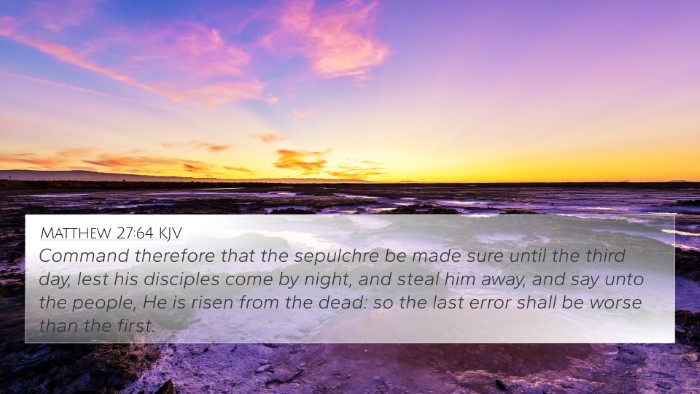
Matthew 27:64 (KJV) »
Command therefore that the sepulchre be made sure until the third day, lest his disciples come by night, and steal him away, and say unto the people, He is risen from the dead: so the last error shall be worse than the first.
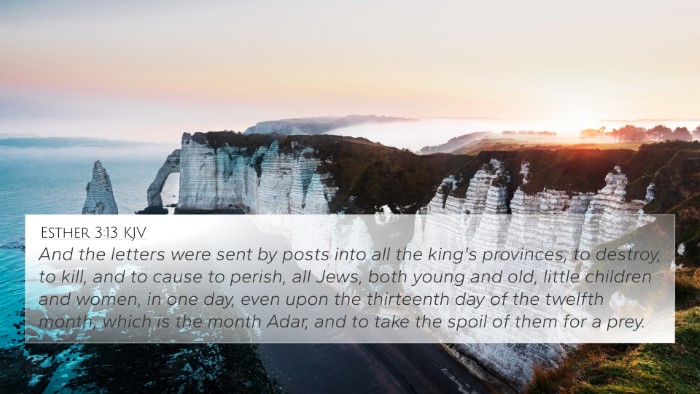
Esther 3:13 (KJV) »
And the letters were sent by posts into all the king's provinces, to destroy, to kill, and to cause to perish, all Jews, both young and old, little children and women, in one day, even upon the thirteenth day of the twelfth month, which is the month Adar, and to take the spoil of them for a prey.

Acts 4:3 (KJV) »
And they laid hands on them, and put them in hold unto the next day: for it was now eventide.

Proverbs 27:1 (KJV) »
Boast not thyself of to morrow; for thou knowest not what a day may bring forth.

Matthew 24:9 (KJV) »
Then shall they deliver you up to be afflicted, and shall kill you: and ye shall be hated of all nations for my name's sake.

Lamentations 3:37 (KJV) »
Who is he that saith, and it cometh to pass, when the Lord commandeth it not?

John 19:23 (KJV) »
Then the soldiers, when they had crucified Jesus, took his garments, and made four parts, to every soldier a part; and also his coat: now the coat was without seam, woven from the top throughout.
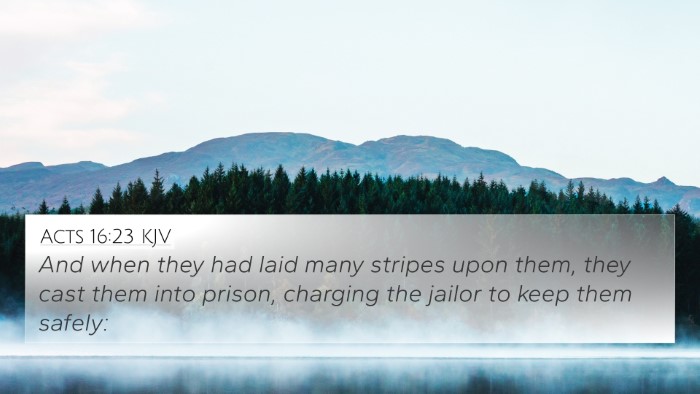
Acts 16:23 (KJV) »
And when they had laid many stripes upon them, they cast them into prison, charging the jailor to keep them safely:

Acts 8:3 (KJV) »
As for Saul, he made havock of the church, entering into every house, and haling men and women committed them to prison.
Acts 12:4 Verse Analysis and Similar Verses
Understanding Acts 12:4
In Acts 12:4, we encounter a significant moment in the early church, centered on the arrest of Peter by King Herod. This verse reads: "And when he had apprehended him, he put him in prison, and delivered him to four quaternions of soldiers to keep him; intending after Easter to bring him forth to the people." Understanding this verse involves exploring its implications, context, and connections with other scripture, providing rich insights into the themes of imprisonment, divine intervention, and the hope inherent in the Christian faith.
Contextual Analysis
Matthew Henry underscores the political and religious tensions of the period, particularly highlighting Herod's desire to please the Jewish leaders. Albert Barnes adds that the arrest of Peter following the execution of James highlights the increasing persecution of the early church. Adam Clarke points out that the term "Easter" (which translates to Passover in some versions) signifies a crucial moment of release, further emphasizing the divine timing in the narrative.
Thematic Exploration
The themes found in Acts 12:4 resonate throughout the New Testament, especially concerning trials, divine protection of believers, and the assurance of God's presence even in dire situations. The convergence of persecution and divine purpose is a dominant theme:
- Persecution: Acts 12:4 reflects the hostility faced by early Christians as they navigated a hostile world.
- Divine Intervention: The narrative showcases God’s ultimate control over earthly powers, leading believers to trust in His deliverance.
- Hope After Despair: The cycle of death and resurrection mirrors larger themes found in the Gospel narratives, encouraging believers to remain steadfast.
Bible Verse Cross-References
Acts 12:4 connects with numerous biblical texts, illuminating the relational depth and interconnectedness of scripture. Some of the notable cross-references include:
- Matthew 14:10 - The execution of John the Baptist, highlighting the violent pressures faced by prophets and apostles.
- Acts 5:18 - The apostles are similarly imprisoned, illustrating a pattern of persecution.
- Hebrews 13:3 - A call to remember those in bonds, encouraging empathy and prayer for those undergoing suffering.
- 1 Peter 5:8-9 - An exhortation to remain vigilant against spiritual adversaries, paralleling the physical threats faced by Peter.
- Psalm 31:15 - “My times are in your hand,” resonating with the underlying trust in God's timing during trials.
- Jeremiah 29:11 - A promise of hope amidst captivity, reinforcing the theme of God’s providence.
- Luke 22:31-32 - Jesus’ prediction of Peter’s trials and ultimate restoration exemplifying God’s mercy in times of testing.
- Revelation 2:10 - A promise of the crown of life for those who endure suffering, tying back to the hope offered in Acts 12:4.
- Romans 8:28 - Illustrates that God uses all circumstances, even imprisonment, for the good of those who love Him.
- Matthew 10:28 - An encouragement not to fear those who can kill the body, but to trust in the Lord’s greater concern for the soul.
Inter-Biblical Dialogue
The events surrounding Acts 12:4 set the stage for an engaging inter-biblical dialogue. This dialogue becomes a tool for deeper understanding and reflection:
- Connecting Old and New Testament: The experiences of the prophets in the Old Testament serve as a precursor for the trials faced by apostles like Peter.
- Comparative Analysis: The comparison between Herod's actions and Old Testament figures like Pharaoh reveals the ongoing conflict between God's messengers and earthly authorities.
- Thematic Connections: The notion of deliverance is central in both the Exodus narrative and the New Testament accounts, affirming God's faithfulness across covenants.
Tools for Bible Cross-Referencing
For those seeking to deepen their understanding of Acts 12:4 through cross-referencing:
- Utilize a Bible Concordance to locate similar themes or words across scripture.
- Explore a Bible Cross-Reference Guide which offers structured ways to engage with scripture connections.
- Employ Cross-Reference Bible Study methods to facilitate group discussions on interrelated verses.
- Make use of Bible Reference Resources which provide scholarly commentary and analyses.
Conclusion
Acts 12:4 serves as a complex verse encapsulating the tension within early Christianity. By analyzing this scripture through various commentaries and collective biblical insights, we uncover not only the historical context but also the spiritual implications relevant to modern believers. The connections forged between this verse and others enrich our understanding of scripture as a living dialogue, reflecting the enduring themes of faith, hope, and divine sovereignty.
